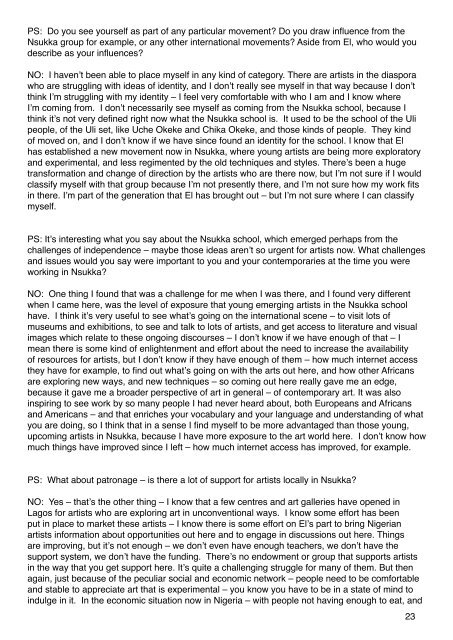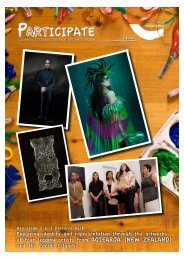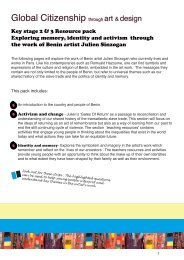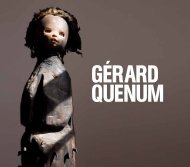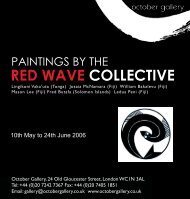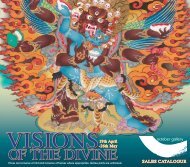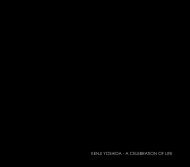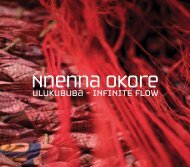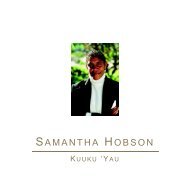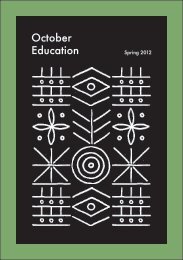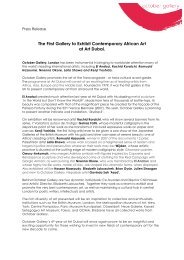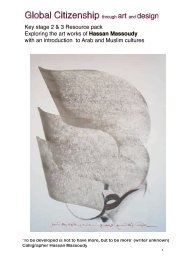Create successful ePaper yourself
Turn your PDF publications into a flip-book with our unique Google optimized e-Paper software.
PS: Do you see yourself as part of any particular movement? Do you draw influence from the<br />
Nsukka group for example, or any other international movements? Aside from El, who would you<br />
describe as your influences?<br />
NO: I haven’t been able to place myself in any kind of category. There are artists in the diaspora<br />
who are struggling with ideas of identity, and I don’t really see myself in that way because I don’t<br />
think I’m struggling with my identity – I feel very comfortable with who I am and I know where<br />
I’m coming from. I don’t necessarily see myself as coming from the Nsukka school, because I<br />
think it’s not very defined right now what the Nsukka school is. It used to be the school of the Uli<br />
people, of the Uli set, like Uche Okeke and Chika Okeke, and those kinds of people. They kind<br />
of moved on, and I don’t know if we have since found an identity for the school. I know that El<br />
has established a new movement now in Nsukka, where young artists are being more exploratory<br />
and experimental, and less regimented by the old techniques and styles. There’s been a huge<br />
transformation and change of direction by the artists who are there now, but I’m not sure if I would<br />
classify myself with that group because I’m not presently there, and I’m not sure how my work fits<br />
in there. I’m part of the generation that El has brought out – but I’m not sure where I can classify<br />
myself.<br />
PS: It’s interesting what you say about the Nsukka school, which emerged perhaps from the<br />
challenges of independence – maybe those ideas aren’t so urgent for artists now. What challenges<br />
and issues would you say were important to you and your contemporaries at the time you were<br />
working in Nsukka?<br />
NO: One thing I found that was a challenge for me when I was there, and I found very different<br />
when I came here, was the level of exposure that young emerging artists in the Nsukka school<br />
have. I think it’s very useful to see what’s going on the international scene – to visit lots of<br />
museums and exhibitions, to see and talk to lots of artists, and get access to literature and visual<br />
images which relate to these ongoing discourses – I don’t know if we have enough of that – I<br />
mean there is some kind of enlightenment and effort about the need to increase the availability<br />
of resources for artists, but I don’t know if they have enough of them – how much internet access<br />
they have for example, to find out what’s going on with the arts out here, and how other Africans<br />
are exploring new ways, and new techniques – so coming out here really gave me an edge,<br />
because it gave me a broader perspective of art in general – of contemporary art. It was also<br />
inspiring to see work by so many people I had never heard about, both Europeans and Africans<br />
and Americans – and that enriches your vocabulary and your language and understanding of what<br />
you are doing, so I think that in a sense I find myself to be more advantaged than those young,<br />
upcoming artists in Nsukka, because I have more exposure to the art world here. I don’t know how<br />
much things have improved since I left – how much internet access has improved, for example.<br />
PS: What about patronage – is there a lot of support for artists locally in Nsukka?<br />
NO: Yes – that’s the other thing – I know that a few centres and art galleries have opened in<br />
Lagos for artists who are exploring art in unconventional ways. I know some effort has been<br />
put in place to market these artists – I know there is some effort on El’s part to bring Nigerian<br />
artists information about opportunities out here and to engage in discussions out here. Things<br />
are improving, but it’s not enough – we don’t even have enough teachers, we don’t have the<br />
support system, we don’t have the funding. There’s no endowment or group that supports artists<br />
in the way that you get support here. It’s quite a challenging struggle for many of them. But then<br />
again, just because of the peculiar social and economic network – people need to be comfortable<br />
and stable to appreciate art that is experimental – you know you have to be in a state of mind to<br />
indulge in it. In the economic situation now in Nigeria – with people not having enough to eat, and<br />
23


